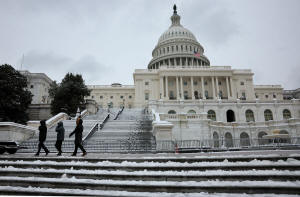US Congress scrambles to pass stopgap bill to avert government shutdown
 Send a link to a friend
Send a link to a friend
 [January 18, 2024]
By Richard Cowan [January 18, 2024]
By Richard Cowan
WASHINGTON (Reuters) - The U.S. Senate on Thursday will aim to approve a
stopgap measure keeping the federal government funded through early
March, averting a partial shutdown that would begin in less than two
days if Congress fails to act.
The Democratic-majority Senate and Republican-controlled House of
Representatives are far behind in carrying out their basic duty of
funding the government for the fiscal year that began on Oct. 1, with
lawmakers scrambling to keep the lights on through early March, to give
them more time to pass a full-year bill.
Top Senate Democrat Chuck Schumer and his House Republican counterpart,
Mike Johnson, early this month agreed to a $1.59 trillion discretionary
spending level for the year that ends on Sept. 30. But in a sign of how
bitterly the Congress is divided, the two parties now disagree on that
number, with Democrats saying the actual amount agreed to is $1.66
trillion.
"I think we're on a good path to getting it done," Democratic Senator
Raphael Warnock told Reuters, referring to the prospects of passing the
temporary spending bill on Thursday or Friday.
The intense jockeying between House Republicans seeking deep spending
cuts and Democrats comes amid a $34.4 trillion national debt that is
rapidly escalating and has prompted worries in part because of the heavy
interest payments now being borne by the Treasury Department.

This third stopgap funding bill, known as a "continuing resolution" or
"CR," would simply extend last fiscal year's spending levels until two
deadlines of March 1 and March 8 for completing action of spending for
various government agencies.
[to top of second column]
|

People walk past a snowy U.S. Capitol building in Washington, U.S.,
January 16, 2024. REUTERS/Leah Millis/ File Photo

Democratic Representative Josh Gottheimer outlined the impact of
possible government agency shutdowns, including a worsening backlog
in veterans seeking disability benefits, a possible suspension of
aircraft safety inspections and a freeze in Agriculture Department
loans and other services to rural communities. Another example,
farther ahead, is that more than 1 million military personnel
temporarily would not receive paychecks.
Senator Susan Collins, the senior Republican on the Appropriations
Committee, said on Wednesday she was optimistic a government
shutdown will be skirted.
"I think we will take up the CR tomorrow," Collins said. But she
expressed frustration at how long it was taking to divide up the
money for the 12 bills providing the full-year budget, adding, "This
has been dragging on for a long time and I really don't know why."
Senate passage of the CR would send it to the House, where Johnson
could face blowback from hardline members of his party who oppose
such stopgap funding bills without deep spending cuts.
That displeasure led last fall to the toppling of Johnson's
predecessor, Kevin McCarthy.
(Reporting by Richard Cowan in Washington; Editing by Scott Malone
and Matthew Lewis)
[© 2024 Thomson Reuters. All rights reserved.]This material
may not be published, broadcast, rewritten or redistributed.
Thompson Reuters is solely responsible for this content. |